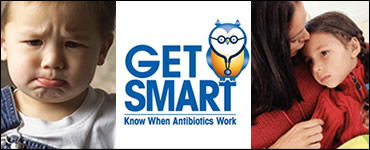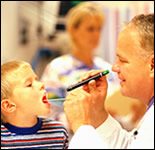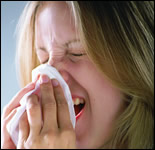CDC Features
Current Features
If You Have a Cold or Flu, Antibiotics Won't Work For You!


It starts with a sniffle or a sneeze. Perhaps a scratchy throat or a sinus headache. You or someone you know gets a cold.
Are you aware that colds, flu, most sore throats, and acute bronchitis are caused by viruses? Did you know that antibiotics do not help fight viruses? It's true. Plus, taking antibiotics when you have a virus may do more harm than good.
When adults and children are given antibiotics incorrectly to treat viral infections, such as colds and flu, those patients aren't getting the best care for their condition. A course of antibiotics won't fight the virus, make the patient feel better, yield a quicker recovery, or keep others from getting sick.
Dangers of Antibiotic Resistance
Antibiotic resistance is one of the world's most pressing public health problems. Antibiotic resistance occurs when bacteria change in some way that reduces or eliminates the effectiveness of drugs, chemicals, or other agents designed to cure or prevent infections. Widespread inappropriate use of antibiotics is fueling an increase in antibiotic-resistant bacteria. So the next time you really need an antibiotic for a bacterial infection, it may not work.

Antibiotics Are Not for Colds and Flu
Taking antibiotics for viral infections — such as a cold, cough, the flu, and acute bronchitis —
• Will not cure the infection
• Will not keep other individuals from catching the illness
• Will not help a person feel better
• May cause an unnecessary harmful side effect
What Not To Do

• Do not demand antibiotics when a healthcare provider says they are not needed. They will not help treat your infection.
• Do not take an antibiotic for a viral infection like a cold, a cough, or the flu.
• When you are prescribed an antibiotic:
– Do not skip doses.
– Do not save any antibiotics for the next time you get sick.
– Do not take antibiotics prescribed for someone else. The antibiotic may not be appropriate for your illness. Taking the wrong medicine may delay correct treatment and allow bacteria to multiply.
What To Do
• Prevent the spread of infections through frequent hand washing.
• When you are prescribed an antibiotic:
– Take it exactly as the healthcare provider tells you. Complete the prescribed course even if you are feeling better. If treatment stops too soon, some bacteria may survive and re-infect you.
• Talk with your healthcare provider about antibiotic resistance.
For More Information
CDC's Web site provides health information for your general knowledge. Concerns about a medical condition–either your own or that of a family member–should always be addressed to your primary care physician for advice and care appropriate to your specific medical needs. CDC does not recommend self-diagnosis or self-management of health problems that should be attended to by healthcare professionals.
• Get Smart: Know When Antibiotics Work or Infórmese: Automedicarse con antibióticos puede perjudicar su salud.
• Get Smart for Healthcare Providers
Page last modified: September 24, 2007
Content source: National Center for Immunization and Respiratory Diseases
Content owner: National Center for Health Marketing
URL for this page: www.cdc.gov/Features/GetSmart

